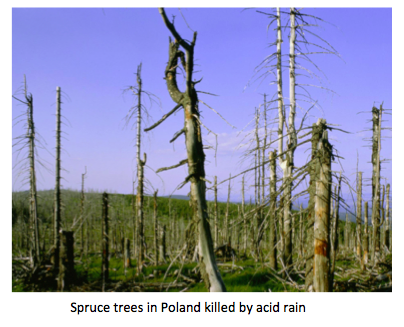8.5 Acid deposition
Written specifically for students to provide help and support for the IB Diploma chemistry programme this page provides full coverage of the syllabus content of Topic 8.5 Acid depositions. It encourages you to think critically and provides many questions with full worked answers so that you can monitor and improve your knowledge and understanding.


 Learning outcomes
Learning outcomes
After studying this topic you should be able to:
 Understand:
Understand:
- Rain contains dissolved carbon dioxide so is naturally acidic with a pH of 5.6. The pH of acid deposition is below 5.6 (usually it is actually below 5.0).
- Acid deposition occurs when oxides of nitrogen or sulfur dissolve in water to form nitric acid, HNO3, nitrous acid, HNO2, sulfuric acid, H2SO4 and sulfurous acid, H2SO3.
- The sources of the oxides of sulfur and nitrogen together with the effects of acid deposition.
Apply your knowledge to:
- Balance equations describing the combustion of sulfur and nitrogen to form their oxides and the subsequent reactions with water to form H2SO3, H2SO4, HNO2 and HNO3.
- Distinguish between pre-combustion and post-combustion methods to reduce emissions of sulfur oxides.
- Deduce the equations for the reactions of the acids in acid deposition with reactive metals and carbonates.
Relationships & vocabulary
Nature of science
Acid deposition is a good example of the risks and problems facing chemistry. Acid deposition, caused from the reactions of non-metal oxides with water, can be discussed from different perspectives. Through understanding the underlying theory, chemists are able to reduce the environmental impact of human activities.
International-mindedness
Often the country causing the pollution is different to the country receiving the pollution. Acid deposition is a secondary pollutant that affects regions that may be far from the primary source. International cooperation. is required to solve this problem.
For more examples and links to International mindedness, Theory of knowledge, utilization etc. see separate page which covers all of Topics 8 & 18: Acids & bases.
Vocabulary
| acid deposition | precipitation | pre-combustion | post-combustion |
Learning slides
You can use this slide gallery for learning or for reviewing concepts and information. It covers all the key points in the syllabus for this sub-topic.
Something to think about
 The term 'acid rain' was first coined by Robert Smith (1817-1884) a Scottish chemist, in a book entitled 'Air and Rain: The Beginnings of a Chemical Climatology' published in 1872. Although the effect of polluting gases from the industrial revolution had been noticed even earlier than that, it was not until the 1960s that it was perceived as a serious problem. In everyday parlance 'acid rain' covers fog, snow and dew as well as rain but the IB more correctly uses the term acid deposition. Technically there is wet deposition due to acidic oxides dissolving and reacting in atmospheric water and dry deposition which covers acidic gases and particles but for this sub-topic the IB does not distinguish between these two categories of acid deposition.
The term 'acid rain' was first coined by Robert Smith (1817-1884) a Scottish chemist, in a book entitled 'Air and Rain: The Beginnings of a Chemical Climatology' published in 1872. Although the effect of polluting gases from the industrial revolution had been noticed even earlier than that, it was not until the 1960s that it was perceived as a serious problem. In everyday parlance 'acid rain' covers fog, snow and dew as well as rain but the IB more correctly uses the term acid deposition. Technically there is wet deposition due to acidic oxides dissolving and reacting in atmospheric water and dry deposition which covers acidic gases and particles but for this sub-topic the IB does not distinguish between these two categories of acid deposition.

Test your understanding of this topic
(Note that your teacher may have restricted your access to some or all of these questions and worked answers if they are going to use them as a class test or set them as an assignment.)
For ten 'quiz' multiple choice questions with the answers explained see MC test: Acid deposition.
For short-answer questions see Acid deposition questions.
More resources
1. The effects of acid rain on buildings in Washington D.C. by Discovery News.
2. A very simple but quite effective video on coal burning power stations and acid rain by Brittanica.com
Effect of acid rain on buildings ![]()
3. A good summary of both the causes and effects of acid precipitation by Fuse School.
![]() Causes and effects of acid rain
Causes and effects of acid rain

 IB Docs (2) Team
IB Docs (2) Team 














